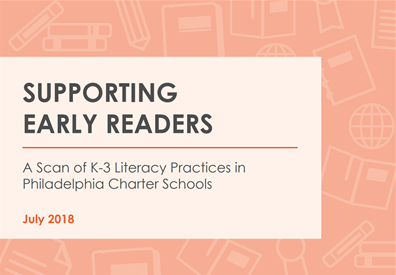By: Rachel Comly, Ryan Fink, Monica Mielke, Adrianne Flack
July 2018
Summary
In Philadelphia, civic and education leaders have identified early literacy programming as critical for overall education improvement. Students who do not reach grade-level proficiency in reading in the earliest grades typically struggle to catch up, and many never do.
The sheer size of the city’s charter school sector, which currently enrolls about one-third of all public school students, positions it as a key agent for improving early literacy in Philadelphia. The flexibility inherent in the charter sector offers opportunities for these schools to develop and test the effectiveness of new approaches to old problems. At the same time, the large number of individual schools and networks makes it difficult to obtain a clear picture of the sector’s approaches to early literacy development.
The purpose of this study is to fill this knowledge gap about how Philadelphia’s charter
schools approach literacy programming in kindergarten through third grade. The study is informed by a large body of research on literacy development in the early elementary years and takes a pragmatic, improvement-oriented approach to the question of how Philadelphia can best support all of its public school students to become capable readers and writers.
The study maps the landscape of charter schools’ approaches to early literacy programming, including their classroom instructional strategies, teacher training and collaboration, family engagement strategies, and targeted interventions for struggling readers.
The research questions are:
-
What K-3 literacy practices are used by Philadelphia’s charter schools?
-
Specifically, what are the schools’ classroom instructional practices, teacher training and supports, targeted interventions for struggling students, and successes and challenges?
-
What resources do schools need to support literacy instruction?
During spring 2018, the study authors interviewed 38 school representatives and charter management organization (CMO) leaders about K-3 literacy practices in their school(s).
Key Findings
-
Philadelphia charter schools report a broadly similar set of approaches to early literacy programming. Most respondents reported that their programs reflect research-based best practices in early literacy: programs address multiple key elements of literacy instruction across individual, small-group, and whole-group settings; schools build and implement a tiered intervention system for students who struggle; schools engage with students’ families to connect programming to students’ lives outside of school; and schools providing training and support for teachers.
-
Charter schools identified staff capacity for high-quality early literacy instruction as a key lever for improvement. Respondents pointed to staff capacity as an integral component for implementation of a strong early literacy program at their school. Staff capacity refers to schools working to deepen the skills of existing teachers and hiring additional staff to support early literacy. Some respondents identified increasing staff capacity as a key challenge facing their school’s early literacy program; others called their investments to support staff capacity a strength of their program.
-
Despite consistency in broad approaches to literacy, charter schools varied widely in their specific resources and strategies. Representatives described variation in their literacy programs’ focus and emphases, the training and supports available for teachers, and the roles and responsibilities of staff supporting their literacy programs.
-
Certain elements of early literacy programming are both strengths of and challenges for charter schools. Each charter school representative identified strengths in their school’s literacy practices. Some schools’ areas of strength complemented other schools’ identified areas for growth. Strengths and challenges are highlighted throughout the report.
Policy and Implications
-
Charter schools share a vision of best practices and, because of their identified strengths and common challenges, may benefit from knowledge-sharing. All schools, whether operating independently or as a part of a network, may have much to gain by looking to one another for solutions to common challenges. The groundwork for this strategic collaboration may already be in place.
-
Charter school leaders could convene to explore a range of opportunities for supporting and strengthening early literacy programs. The opportunity for knowledge-sharing identified in this study suggests several possible options, including creating a professional learning network or developing a workshop series based on schools’ identified needs. Local organizations, such as Philadelphia School Partnership (PSP) and Philadelphia Charters for Excellence (PCE), that have served as conveners within the charter sector, might provide a venue for schools to learn from one another.

